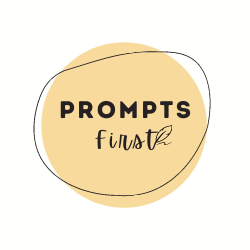Journaling for beginners can be hard or challenging at first. There’s no secret here, building a new habit is always challenging. Journaling is a positive habit that can bring lots of benefits to your personal and professional life.
In this post, we’ll discuss journaling popular questions, and how to set up a journaling habit and we’ll go over some journaling tips for beginners.
Without further ado, let’s get started with journaling basics.
What is a journal?
A journal can be anything you want. It’s a safe place to organize your thoughts, your questions, your goals, and your dreams. There are no right or wrong ways to journal. You can use it to share your opinions, decisions, plans, and experiences. In other words, it’s a way to collect your ideas and thoughts.
There are different types of journals.
Basic Journal
A basic journal is a journal with blank pages or with lines. You can use it the way you want and when you want.
Bullet Journal
A bullet journal is basically an upgraded version of a basic journal. It can be a mix of to-do lists, drawings, writings, and more. A bullet journal is an organization system that was developed by Ryder Carroll.
You can learn more about his method in his book The Bullet Journal Method.
Art Journal
An art journal is a creative way to let your thoughts go by drawing, painting, creating collages, etc. It’s about expressing your thoughts with art.
Online Journal
An online journal is a digital journal that you can use on your desktop or via an app. You can set up some features in which you can look back to what you wrote months or years ago. You can find free online journals and paid versions.
Writing vs typing – which is better for journaling?
If you’re wondering if it’s better to write by hand or type a journal, I’d suggest you try both and you decide what’s better for you. Sometimes, I think typing is better because my thoughts are fast and it’s easier for me to type them ad organize them that way. But, some other times, I find writing by hand to be more effective because it’s calming.
Many people prefer to write by hand but it could depend on your writing goals too. If you’re writing for yourself, journaling by hand makes more sense. But if you’re writing with the hope of finding a creative idea for a blog or a book, typing could save you time.
Why should you start journaling?
There are several benefits to journaling. As I mentioned above, journaling daily helps you organize your thoughts, goals, ideas. Not only will it help you focus on the positive, but it will also reduce your stress and increase your self-awareness.
When journaling, you can set up goals, boost your creativity and productivity. Whether you simply need the stress relief, you’re juggling huge projects or you’re trying to achieve success, journaling is a healthy tool and habit.
What to write in a journal?
The great thing about journaling is that there are no rules. You can decide what you want to write about. Here are some journaling ideas for beginners:
- Goals
- Intentions
- Ideas
- Dreams
- Bucket lists
- Gratitudes
- Affirmations
- Emotions
- Experiences
- Summaries of your days
- Thoughts
- Stories
How often should you be journaling?
To get the full benefits of journaling, I recommend journaling daily. Although you can fix your own rules – you could journal weekly, on weekdays, etc. I personally journal every morning and I can also add more journaling sessions throughout the day if something comes up or if I feel stressed.
How to create a journaling habit?
The best way to create a journaling habit for beginners is to pick a moment of the day and a place where you’d like to journal. It can be flexible and you don’t necessarily need to have a fixed time for it (unless it helps you, of course).
Generally speaking, many people choose the morning because it helps to start the day with a clear vision of the day ahead.
At first, it can be hard to stick to the journaling habit, so you may want to add a challenge by using journaling prompts or minimum pages to write. We’ll get back to journaling tips for beginners further. You could also add a reminder to make sure to remember to journal.
When is the best time to journal?
The best time to journal is the time that suits your needs and your life. While many of us prefer to journal in the morning, you may need to experiment at different times and see what works better for you.
Now that these questions are out of the way, let’s discuss the best journaling tips for beginners.
Journaling tips for beginners
Wondering how to start journaling for beginners? The first step is to pick a journal in which you feel comfortable to write. You can pick your journal amongst the following categories.
Best journal for beginners
If you’re thinking of buying your first journal, here are some recommendations. The links will bring you to Amazon where you can order a journal in just a few clicks.
Best basic journal:
Best bullet journal:
Best art journal:
Best online journal:
Finding the right journal is an important step since you must find something that suits your needs to help you stick to your new journaling habit. You can browse journals on Amazon here.
Find a quiet spot
Journal writing for beginners can already be challenging, so you got to make sure to have a quiet spot away from distractions. You can let your phone somewhere else, so you can really focus on your journal.
I recommend picking a comfortable spot. You can even put music on if it helps you focus. I personally like listening to low-fi beats playlists.
Use a form of accountability
To help you stick to your journaling habit, you can set up a reminder on your phone, or an app to track habits. Once you get started, you can decide on a minimum number of pages to write, a minimum word count, or you can set up a stopwatch and write for x amount of time. This way, you’re forcing yourself to go beyond the blanks and you’re pushing yourself to write longer. I personally like to use a minimum of words which helps me write more than I would usually do.
Use journaling prompts
If you’re wondering what a journaling prompt is, let me explain. A journal prompt is a sentence, a question, or the beginning of a sentence designed to spark inspiration. It gives you an idea of what to write about. It’s easier to get started with an idea than staring at a blank page. You can browse our lists of journaling prompts on PromptsFirst.
Make a list of gratitudes
Making a list of things you’re grateful for can be useful when you don’t know what to write about. It helps you focus on the positives in your life instead of focusing on the negatives. It can be beneficial for your mental health and for stress relief while putting things into perspective.
Find the journaling technique that works for you
At the end of the day, there are no rules when it comes to journaling. In fact, journaling should be a positive moment of your routine, and you may need to experience to find what strategies work better for you.
Whether you’re into art, bullet techniques, or basic journaling, you can experiment with different techniques before deciding to stick to your journaling habit.
Final thoughts on journaling for beginners
Journaling for beginners can take longer at first, but eventually, you’ll get more comfortable and you’ll be able to journal at ease. The hardest thing is to stick to your journaling habit which is why you may need some form of accountability at first.
It’s a great idea to remember the reasons why you decided to start journaling in the first place. This way, you can stay motivated and stick to your new habit.
Take a look at this list of journal prompts for beginners to help you get started with journaling.
Journal prompts for beginners
- What are you grateful for today?
- What did you learn in the past 24 hours?
- How can you be the best version of yourself today?
- What are three things you’re planning on doing for yourself today?
- What goals are you working towards this week?
- What do you like about your life?
- What do you want to feel today?
- What are you looking forward to today?
- This time last year…
- What are you proud of this week?
Need more inspiration? Check this list of journaling prompts for self-discovery.
If you wish to encourage your teen to journal, here’s a list of the best journal prompts for teenagers.

